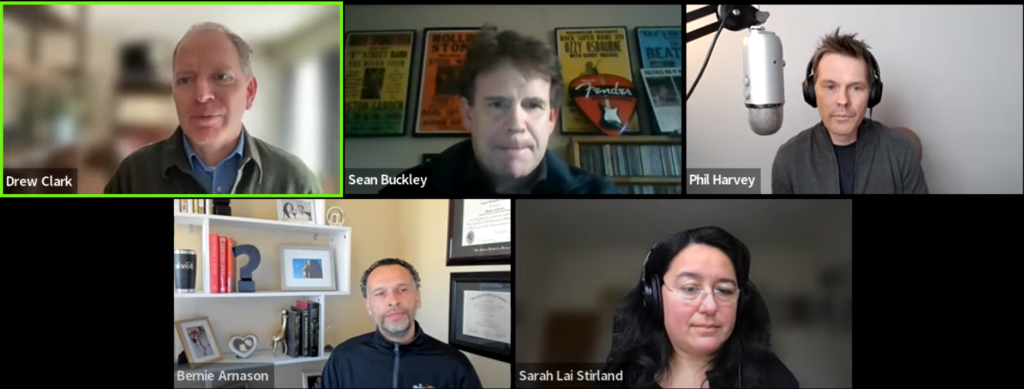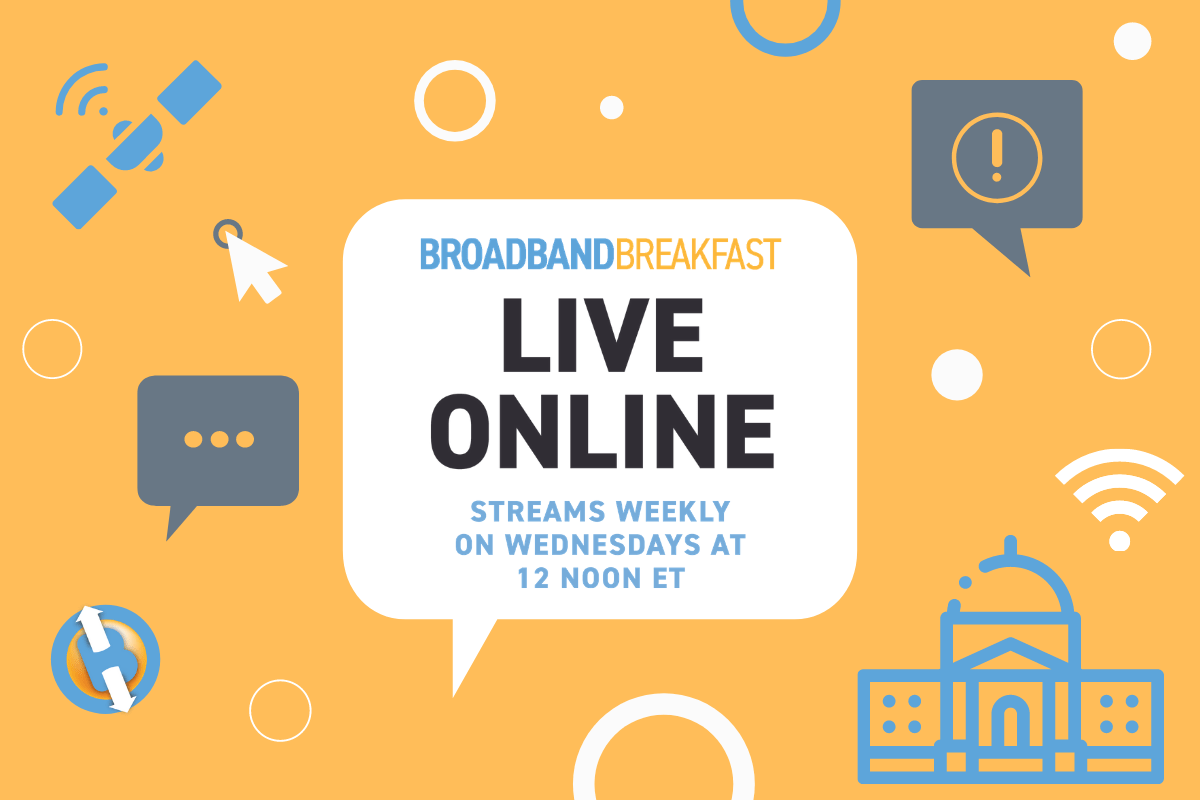Leading Telecom Media Heads Expect More Fiber and Public-Private Partnerships in 2022
Leading figures in telecom media share thoughts on what the next year will hold for the industry.
Benjamin Kahn

WASHINGTON, December 29, 2021 — Telecom experts expect 2022 to be a year of transition, as companies increasingly move toward fiber and public-private relationships and away from Huawei.
During Wednesday’s Broadband Breakfast “New Years’ Eve Party” event, editor in chief of Broadband Communities Sean Buckley said he expects 2022 to be a “time of transition,” referencing renewed talks about net neutrality and a greater emphasis on fiber over fixed wireless technology.
His statements were echoed by Light Reading editor in chief Phil Harvey. He added that the sector is not just shifting toward specific technologies, he said it is also shifting away from certain hardware providers due to the trade war with China.
“In general, you’re finding that Huawei is a lot less influential as a dominant player.”
Harvey said that while consumers should still expect Huawei to remain a global force in 5G fiber-to-the-home gear in Africa and China – at least in part attributable to its relatively low price – its presence on the “entity list” has made it a less popular choice for Western markets. The Federal Communications Commission has moved to block approvals of Chinese-based companies as part of the Secure Networks Act, while the White House has aggressively pushed an agenda that prohibits investments in those kinds of companies.
Harvey also explained that this has forced Huawei to develop its own chipset and explore other areas of expansion, such as smart vehicles. Despite Huawei’s diminished presence in the West, Harvey described the company as “very smart, very aggressive, and very well-funded,” adding, “they are going to change a little bit, but they are not going away.”
In fact, John Suffolk, Huawei’s global head of cybersecurity and privacy officer, told Broadband Breakfast earlier this year that the clamp down on the company will only make it more resilient and self-sufficient.
Harvey also said he expects public-private and municipal government efforts to become more popular in 2022, but that municipal efforts should expect to face significant backlash from incumbent providers.
“No one will get in the way of broadband more than incumbents,” he said. “They are pretty awful people,” he joked. He said that lobbyists representing incumbent providers would likely step-up their efforts to make municipal buildouts more difficult if not impossible to establish.
Vermont, for example, is actively engaged in public-private partnerships on its way to broadband buildouts. Such parties in the state recently came together to buy thousands of miles of fiber for a large build.
Telecompetitor’s editor in chief Bernie Arnson said that while he agrees that there will likely be a shift toward partnerships between municipalities and private entities, the model will not be a “silver bullet solution everywhere,” and that every community will need to assess its own demands and capabilities to determine which model will be best for them.
When asked about consumer preferences regarding models and technology, Broadband.Money Deputy Editor Sarah Lai Stirland said that she doubts consumers really care about how they get their broadband, so long as they actually get it.
“At the end of the day, people are desperate to get online,” she said. “The end consumer does not really care.
“I think it just matters to people in D.C. and telecom lobbyists,” she said.
Our Broadband Breakfast Live Online events take place on Wednesday at 12 Noon ET. You can watch the December 29, 2021, event on this page. You can also PARTICIPATE in the current Broadband Breakfast Live Online event. REGISTER HERE.
Wednesday, December 29, 2021, 12 Noon ET — New Years’ Party
Join the Broadband Breakfast team and our guests as for a year of broadband in review. We’ve invited editors and journalists who cover broadband to give their perspective on the news of 2021. This includes weathering the never-ending pandemic, the beginning of the administration of President Joe Biden, and the passage and signing of the largest infrastructure funding bill in a generation, with $65 billion in funding for broadband. Tune in as we discuss what went right for broadband in 2021, what could have gone better, and what’s likely to happen in 2022.
Panelists for this Broadband Breakfast Live Online session:
- Sean Buckley, Editor in Chief, Broadband Communities
- Sarah Lai Stirland, Deputy Editor, Broadband Breakfast and Broadband.Money
- Phil Harvey, Editor in Chief, Light Reading
- Bernie Arnason, Editor in Chief, Telecompetitor
- Drew Clark (moderator), Editor and Publisher, Broadband Breakfast

Sean Buckley is the Editor in Chief of Broadband Communities. Buckley comes to the magazine publishing and conference company after serving nine years as Senior Editor at FierceTelecom, a daily online newsletter. He also oversaw FierceInstaller, a weekly publication chronicling trends in network installation. Prior to coming to FierceTelecom, Sean spent eight years at Horizon House publications, serving as senior editor and later as Editor in Chief of Telecommunications Magazine and Telecom Engine.
Deputy Editor Sarah Lai Stirland leads Broadband Breakfast’s work with Broadband.Money. She recently rejoined Broadband Breakfast after a several-year hiatus, and has covered business, finance, telecommunications and tech policy from New York, Washington and San Francisco for Wired, Red Herring, National Journal’s Technology Daily and Portfolio.com. She’s a native of London and Hong Kong, and is currently based in the Bay Area.
Phil Harvey has been an editor at Light Reading for a combined 16 years. He (barely) manages editorial operations and news coverage for the Light Reading network’s digital properties, including Light Reading and Broadband World News.
Bernie Arnason brings more than 25 years of telecom industry experience to Telecompetitor and Pivot Group. Bernie follows the broadband industry closely and conducts industry research and analysis, provides strategic consulting for clients, and is the Editor in Chief of Telecompetitor, a leading online broadband industry publication.
Drew Clark is the Editor and Publisher of BroadbandBreakfast.com and a nationally-respected telecommunications attorney. Drew brings experts and practitioners together to advance the benefits provided by broadband. Under the American Recovery and Reinvestment Act of 2009, he served as head of a State Broadband Initiative, the Partnership for a Connected Illinois. He is also the President of the Rural Telecommunications Congress.
WATCH HERE, or on YouTube, Twitter and Facebook.

As with all Broadband Breakfast Live Online events, the FREE webcasts will take place at 12 Noon ET on Wednesday.
SUBSCRIBE to the Broadband Breakfast YouTube channel. That way, you will be notified when events go live. Watch on YouTube, Twitter and Facebook.
See a complete list of upcoming and past Broadband Breakfast Live Online events.









Member discussion